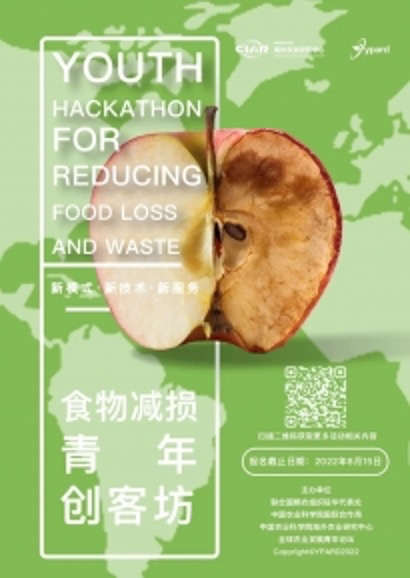2022 Youth Innovation Workshop on Food Loss Officially Launched
Since 2014, the number of people affected by hunger worldwide has been steadily increasing. The global COVID-19 pandemic has further exacerbated the challenges to food security in many countries. According to the Global Report on Food Crises 2022 , approximately 193 million people across 53 countries and territories experienced crisis-level or worse acute food insecurity in 2021, an increase of nearly 40 million from 2020.
However, an immeasurable amount of food is still lost and wasted every day around the world. According to United Nations agencies, about 14% of the world's food is lost between production and retail stages. In 2019, 17% of the food available to consumers was wasted in households, retail outlets, restaurants, and other food services. This not only exacerbates global hunger and food insecurity but also worsens climate change, biodiversity loss, and pollution, threatening humanity's future.
In developing countries, food loss mainly occurs at the early stages of the supply chain, with post-harvest loss making up a significant portion of total food loss and waste. In developed countries, most food waste occurs at the retail and consumption stages of the food supply chain. Therefore, reducing food loss and waste urgently requires strengthened international cooperation, effective resource utilization, and the development of food loss reduction strategies tailored to each country’s circumstances.
To raise awareness among youth about reducing food loss and waste, and to encourage them to adopt innovative and inclusive approaches to contribute wisdom and solutions to global food loss reduction, the Food and Agriculture Organization of the United Nations in China (FAO China), the Chinese Academy of Agricultural Sciences Overseas Agricultural Research Center (CIAR), and the Young Professionals for Agricultural Development (YPARD) have jointly initiated the 2022 Youth Innovation Workshop on Food Loss. This event is co-hosted by the World Food Forum (WFF), the China International Communications Group (CICC), Rural Notes, and MODEL APEC, calling on young people from all nations to collaborate and contribute their energy to the sustainable development of global agriculture.
Objectives of the Event
Respond to the initiatives of the Food Systems Summit, promoting and advocating the concept of food loss reduction.
Enhance youth engagement in agriculture, focus on food security, and reduce food loss and waste.
Identify innovative practices in new technologies, models, and services.
Build an international exchange platform in the field of food loss reduction and cultivate young talents.
Main Content
In this Innovation Workshop, teams will showcase to audiences and users how to turn the challenges of food loss and waste into opportunities in a sustainable way, focusing on all aspects of the agricultural value chain, including but not limited to: production technologies (such as farming and breeding), processing technologies, logistics, transportation and storage, consumption and catering services, nutrition and health, agricultural IoT information technology, and agricultural machinery and equipment.
Teams are required to propose innovative solutions, including new agricultural technologies, information and communication tools, software, mini-programs, sustainable products, or new business models and service models. These innovative solutions should be characterized by efficient innovation, flexible application, and feasibility, with a focus on sustainable products and services that consider environmental, social, and economic factors.
The Youth Innovation Workshop will be divided into three stages: preliminary selection, training, and the final competition.
Teams form independently and choose their own themes.
Teams submit their preliminary proposals according to the event’s format and timeline.
The judging panel evaluates the preliminary proposals submitted by each team and selects finalists.
The organizers will provide skills and technical training for the teams selected for the final competition.
The finalist teams will compete in the final round at the designated venue of the Innovation Workshop.
Eligibility Criteria
The main members of the team must be between the ages of 18 and 40, with no restrictions on nationality, major, or profession, and must be able to use English as a working language. You should be passionate about technology or innovation, committed to the concept of food loss reduction, and capable of seeking innovative solutions.
Teams are formed independently according to the needs of their projects to participate in the preliminary selection, training, and final competition of the Innovation Workshop. An ideal team would have members with the following professional backgrounds or skills: agriculture-related disciplines, information technology/software engineering, project management, marketing/new media communication, data engineering, artificial intelligence, etc.
What Will You Gain from the Innovation Workshop?
The winning teams will receive generous prizes.
Engage in an immersive innovation and entrepreneurship activity and connect with like-minded peers.
Network with experts from UN agencies, the Chinese Academy of Agricultural Sciences, and other industry professionals.
Receive evaluations from industry experts and guidance from relevant mentors.
Gain numerous ideas on how to reduce food loss and waste.
Enjoy a team working environment that inspires enthusiasm and creativity.
Experience the dynamic exchange of diverse cultures and perspectives.
Build an international vision and network.





